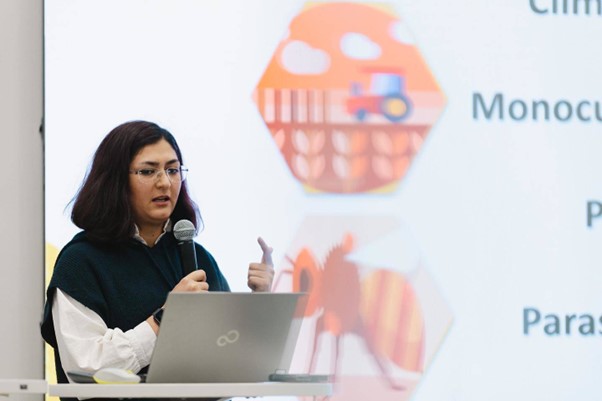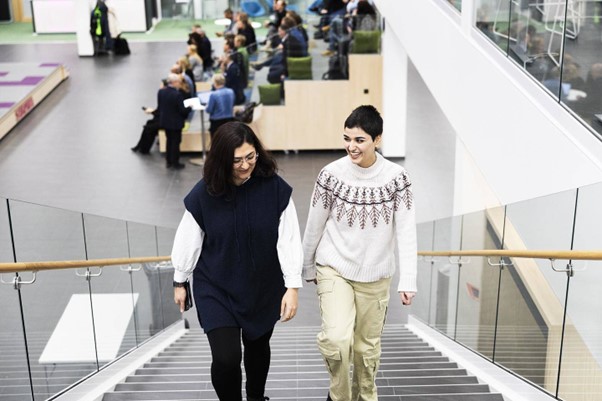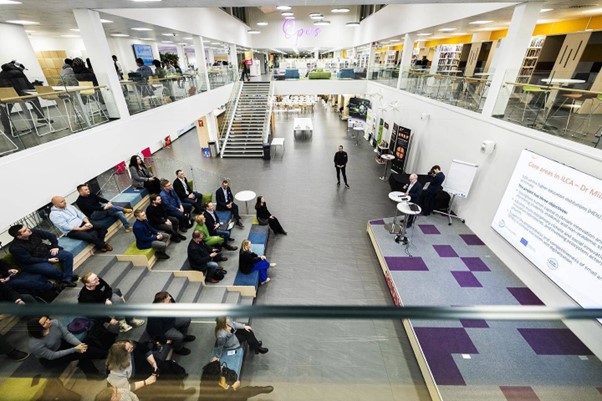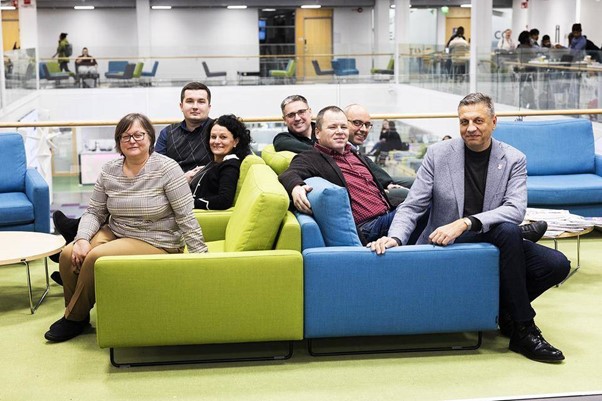
Bees help in product development –
WonderBee is a super food for bees
Savonia University of Applied Sciences collaborates innovatively with international partners. The goal is to prepare local climate road maps for climate change mitigation, adaptation and crisis management.
Arezoo Rahman, the founder of WonderBee, has six bee colonies of her own that help with product development work.
– The well-being of the bees improved, their ability to hibernate strengthened and honey production increased by more than 20 percent, describe the effects of the bee superfood they developed, Vijay Burman and Arezoo Rahmani, the founders of Kuopio-based WonderBee.
WonderBee manufactures a probiotic pollen substitute that can save bees from food shortages caused by climate change. The entrepreneurs have utilized the expertise of Savonia’s international students in the development of their company. One of those involved in the development work is Tanian Memarian, who studies international business at Savonia. She says that she learned a lot about teamwork, sustainable development and the importance of bees as maintainers of biodiversity.
– We had four case companies and three different teams for each company. We came up with different development plans for WonderBee, for example to find financiers and customers. We proposed the establishment of an international virtual community where customers and financiers could get information about the product, as it needs more product awareness.
The entrepreneurial duo Burman and Rahmani remind us that bees are one of the most important species in the world. That’s why they believe in their product and its breakthrough in the market.
– We are currently looking for funding. Once we have received a patent for the product, we can expand first to Europe and then to the rest of the world. We have no restrictions on that.

The solutions only help when they are put into practice
The international students who helped WonderBee are involved in the international ILCA climate innovation project coordinated by Savonia, which aims to find and implement new sustainable development methods in the changing climate. At the same time, cooperation with companies, public actors and citizens is strengthened. In addition to students, industry experts from Bulgaria, Lithuania, Romania and Ukraine are involved in the project.
Natural Resources Institute (Luke), Finland Maaninga’s research station strives to find solutions to reduce agricultural greenhouse gas emissions and to enhance nutrient cycling and carbon sequestration.
– Solutions based on science are needed to curb global warming, but the solutions are only effective if they are applied in practice. The interstate cooperation and information exchange of the ILCA project has provided new information on issues related to climate change. Multidisciplinary cooperation has enormous potential, emphasizes Luke’s leading expert Mikko Järvinen.
According to Diana Lukmine, a senior researcher at the Lithuanian Research Centre for Agriculture and Forestry, new research is needed in order to better understand the processes related to climate change on a global scale as well.
– We are testing a new forecasting method related to adaptation to climate change. An important lesson for us has been networking and new efficient ways to cooperate with partners. I hope that in the future we will be more flexible towards changes.

Gaps in knowledge should be patched
On the same lines as Lukmine is rector Rolandas Vitkūnas from Vilnius College of Technologies and Design, Lithuania. In order to promote innovation, the educational institution has mapped the knowledge gaps of the staff and is doing a new type of cooperation with the agricultural research center.
– Staff and students are currently completing the micro-degrees we have developed. We have a joint Innovation Laboratory with the Lithuanian Research Centre for Agriculture and Forestry, which has proven to be very promising. We strive to develop it into a vibrant and solid forum that brings different actors together and gives room for discussions.
Ukraine, known as the breadbasket of Europe, suffers from extreme weather phenomena that have a big impact on agriculture. That’s why we have to respond quickly to the challenges, reminds Anton Tkachenko, Head of Department in the National Scientific Center Institute Of Agriculture NAAS, Ukraine in Kyiv.
– The ILCA project offers a platform that can be used to improve capabilities in the face of climate change and digitalization and promote the resilience of our agricultural community amid geopolitical challenges.
Dean Ruslan Biloskurskyi, Yuriy Fedkovych Chernivtsi National University, Ukraine, appreciates the international experience and expertise of the ILCA project partners.
– We especially value the cooperation with Finland, which is one of the most innovative countries in the world. We have launched an education and science laboratory that organizes student incubator programs. We support the development of business ideas and offer advisory support to companies that intend to become entrepreneurs and already operating companies.
History and modern technology are combined in architecture.
The challenges brought by climate change have also been awakened in Romania. ILCA’s project coordinator Carmen Nastase from the Stefan cel Mare University of Suceava especially praises the project’s emphasis on problem solving and innovation.
– As universities, we have to guarantee that our education programs are not too academic, but respond to climate change problems and society’s needs. This requires the development of curricula that provide students with practical skills to combat climate change.

Nastase highlights Bucovina’s wooden and clay houses, which are a model example of sustainable construction and a strong connection to the region’s history.
-The houses use locally sourced natural materials and also show a deep understanding of environmentally friendly building practices. By incorporating these architectural techniques into the curriculum, students learn to apply sustainable construction methods to today’s construction while maintaining a connection to our history.
The article originally appeared in finnish on Savon Sanomat 11.12.2023.